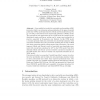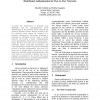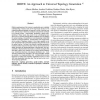1102 search results - page 27 / 221 » Distributed Key Generation for the Internet |
136
Voted
FLAIRS
2008
15 years 4 months ago
2008
One of the central problems in building broad-coverage story understanding systems is generating expectations about event sequences, i.e. predicting what happens next given some a...
128
click to vote
ISBI
2004
IEEE
16 years 3 months ago
2004
IEEE
The practice of image processing inherently requires software development. Creating this technology requires designing, implementing, debugging and testing software applications o...
119
Voted
EUROCRYPT
2003
Springer
15 years 7 months ago
2003
Springer
A new public-key model for resettable zero-knowledge (rZK) protocols, which is an extension and generalization of the upper-bounded public-key (UPK) model introduced by Micali and ...
123
click to vote
SAINT
2003
IEEE
15 years 7 months ago
2003
IEEE
A public key infrastructure is generally (and effectively) used for cryptographically secure authentication in the networks. Ad-hoc networks are formed in haphazard manner. Securi...
132
Voted
MASCOTS
2001
15 years 3 months ago
2001
Effective engineering of the Internet is predicated upon a detailed understanding of issues such as the large-scale structure of its underlying physical topology, the manner in wh...



